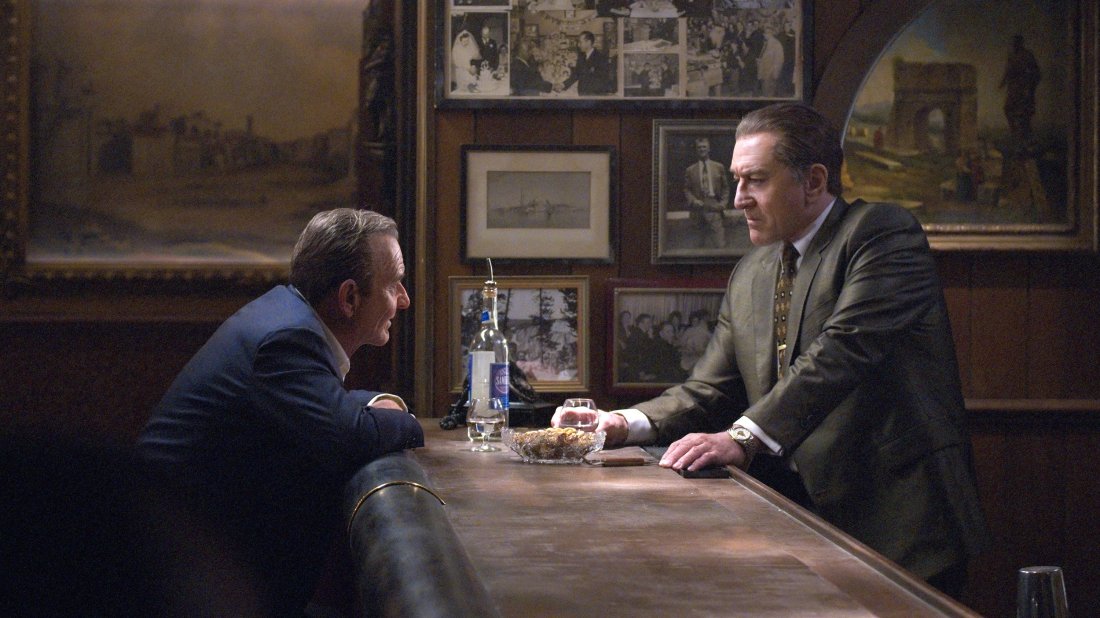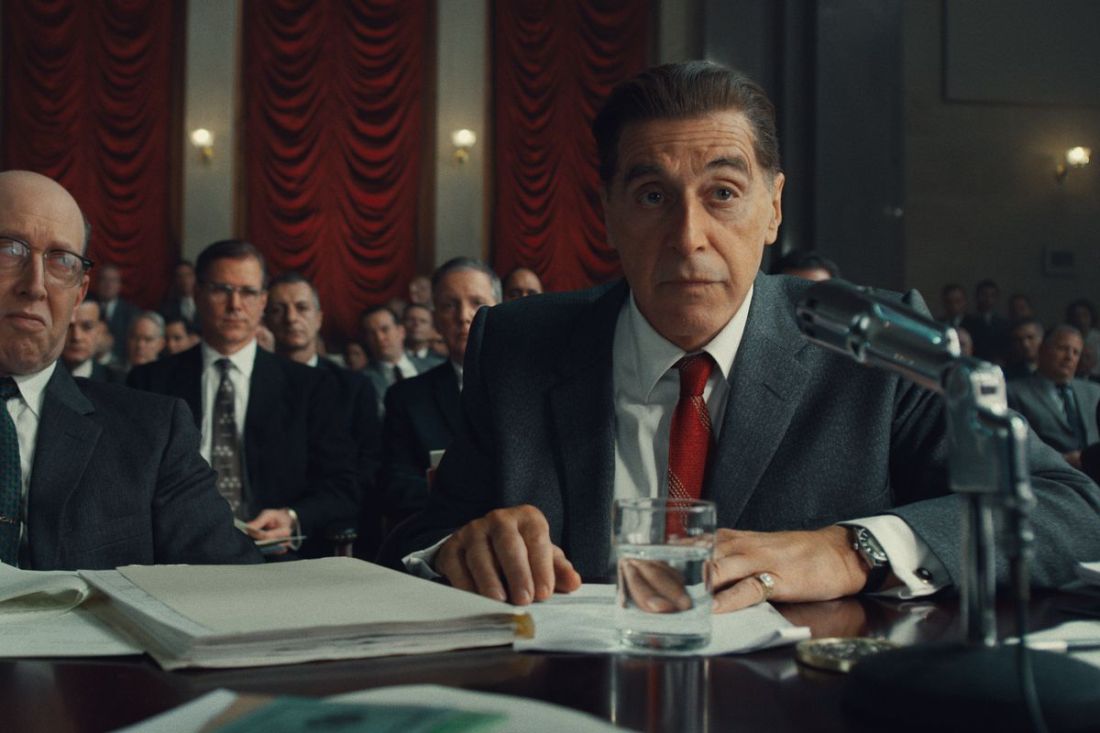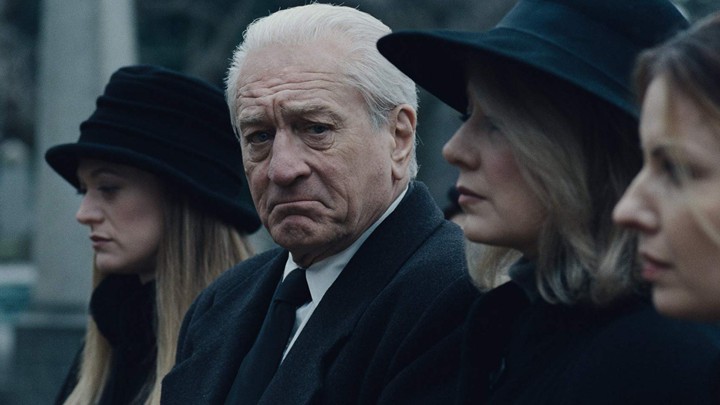The Irishman (2019) is the latest audiovisual entertainment from Martin Scorsese. It stars Robert DeNiro, Al Pacino and Joe Pesci in the (mostly) true story of a driver-turned-hitman reflecting back on his life of crime. The sprawling crime epic has been Scorsese’s dream project for years, and he finally got the chance to make it with the backing of Netflix. Is it worth the hype? Could this be the next Best Picture winner?

I’ve made it no secret that I’m not the biggest Martin Scorsese fan. His narrative style often grates on me, and the films that are often touted as among his best (Goodfellas, Casino, etc.) just don’t work for me. Visually speaking, I have great respect for him and he has proven that he knows how to work with strong scripts (ie. The Departed, The Wolf of Wall Street). It’s controversial to say, but I think his work in the 21st century is better than that in the 20th, and I had high hopes that The Irishman would be a continuation of his hot streak rather than a throwback to his earlier works that I can’t quite jive with. And while the film definitely bears strong similarities to those past crime epics he’s best known for, it is a successful marriage of both eras of Scorsese and (mostly) entertained me.
Let’s talk about the length first, since it has dominated the narrative surrounding the film thus far. Three hours and thirty minutes is just too fucking long in my honest opinion. Obviously there are exceptions to every rule, but the roughly two-hour mark has become the standard as a logical and satisfying end point for a complete story. As someone who analyzes films for their scripts first and foremost, I feel that films are best served existing for as long as it takes to tell its story in its entirety, no more and no less. My primary problem with Scorsese is that he’s less interested in telling a traditional story than in worldbuilding and developing character to (IMHO) an excessive degree. A normal film might include a scene that sets up a character as shady. Scorsese will give us a half-hour of backstory so we fully understand the depths of this character’s shadiness. It’s just his style, and for some people it works, but for me it’s unnecessary.

The Irishman is a story within a story within a story. Present-day Frank Sheeran (80-something) is telling us a story about a road trip he took (60-something) while also reminiscing about the beginnings of the key relationships in the plot (20- to 40-something). This gives our protagonist the opportunity to deliver the trademark “Scorsese voiceover” and give us excessive detail about everyone and everything that’s happening. Netflix infamously gave Scorsese a blank check to do whatever he wanted, so it seems he threw in everything and the kitchen sink to familiarize us with the setting and characters. Would he have included a sequence of Sheeran in WWII as a 20-something if Scorsese didn’t have the budget to de-age De Niro? Would he have meticulously recreated so many elaborate period sets that aren’t essential to the main plot? Hey, I guess in the age of Netflix, viewers won’t care that much about too much content so long as it’s not too little.
Much ado has been made about the de-aging technology used in the film, and after seeing the film all the way through, I can attest that it is…fine. The first few scenes with it are pretty jarring, as it feels less like we’re watching De Niro and more like we’re watching him do a Polar Express motion capture. The biggest problem is the eyes; they always looked glassy and a little too un-real. There are also times that the characters are called to perform physical motions that the aging actors simply can’t anymore; watching De Niro’s character beat somebody up was laughable when what should be a 50-something whooping ass looks like a geriatric flailing about. Al Pacino doesn’t look too bad since he’s pretty consistently the same throughout, while Joe Pesci looks fine since his character isn’t called upon to do too much physically or expressionistically. But overall I can’t help but wonder if it was a wise decision to attempt this technology when audience immersion is so critical. It’s passable at least, so whatever.

All of this isn’t to say this is a bad film in the slightest. The script by Steve Zaillian (clocking in at a modest 135 pages, mind you) is primed for good drama and tension, and I enjoyed the central relationships between Sheeran, Hoffa and Buffalino. I also thought the narrative structure was pretty clever; telling it out-of-order and starting with an old man recounting a benign road trip is a good way to develop natural curiosity in the audience and make us question what could be just down the road (figuratively AND literally). It also makes a lot of sense considering the final 30 minutes or so…but we’ll get to that later. Zaillian and Scorsese do a great job of establishing the friendly-animus relationship between Buffalino and Hoffa, which is especially effective if you’ve seen Scorsese’s other films and understand the subtext to the big crime organizations’ respectful yet distant treatment of one another. Framing the story through the eyes of an everyday working man caught in the middle of an epic showdown is a great way to get the audience invested and be both fearful and morbidly curious about what might go down.
The best part about this film is the way it thematically concludes. Scorsese has been criticized (unfairly) in the past about his hyper-violence and infatuation with shady characters. Whereas earlier in the film he might have concluded this story with Sheeran popping Hoffa and leaving the life of crime, here he is not let off the hook: we watch him fade away into a tired and lonely old man, his past decisions come back to haunt him. A greater emphasis is placed on his relationship with his family, usually window-dressing for a Scorsese film – particularly with his daughter and how she perceives his cruel acts and choice of profession. The film also demonstrates an obsession with death and the manner thereof: we will often get title cards showing us the ultimate fates of many of the principal participants in the crimes. It’s as if Scorsese is reminding us that we all end up in the same place, and whether we’re capped in the back of the head at 50 or live long enough to die of pancreatic cancer at 80, the only thing that matters is how you conducted yourself and who loved you in life (and thereafter). While Sheeran escapes the events of the plot unscathed physically, he is faced with a reckoning that many of his fallen brethren never were. Was he truly victorious in the end?

The Irishman is very much a reflection on life as a whole; it’s not just about the crimes that Frank commits, but how his actions impact his relationships with his family and his legacy as a man. The final half-hour sees Frank going through the end-of-life motions: buying a casket, selecting a burial plot, consulting with a priest. Death has become such a trivial and thoughtless process in film (especially Scorsese’s) that it’s rare to see the topic discussed in such great, banal detail. It’s often uncomfortable to watch characters ruminate on their impending death; we’d rather watch someone get shot in the head than slowly deteriorate and suffer in their final days. Scorsese forces us to sit with Frank in that hospice, alone, with nothing to distract us from thinking on our past mistakes and how they reflect on our soul. Scorsese is no spring chicken himself; he may be in good health and could have decades left to live, but he’s clearly in a contemplative mood in his old age. This film reflects his desire to look back at life and how choices really matter…cutting through the bullshit of audience desensitization and forcing us to really think about what it all means.
Furthermore, Scorsese really reckons with the male archetype and explores it in a way he hasn’t really done before. Sure, almost all of his films are male-centric and deal with decidedly masculine topics, but rarely does he peel back the layers and look at how gender dynamics come into play in his films. The term “toxic masculinity” is a bit of an overused buzzword in film discourse, but here it’s surprisingly apt and not entirely obvious to the untrained eye. Male companionship is explored generously here, and the idea of two men being able to connect on a level beyond mere friendship. Whereas previous Scorsese characters’ wives feel underdeveloped and ignored, here it is very much by design; he is more interested in how Frank interacts with his friends and his offspring than his sexual counterparts. And as with his crimes, Frank’s masculine behavior is not excused; his daughter ultimately wants nothing to do with him after a lifetime of exhibiting the very male behavior that Scorsese characters have become known for: cheating, lying, punishing, killing.

Finally, let’s talk about the technical aspects of the film. As always, Scorsese’s vision is unparalleled and the world he created looks fantastic. Gorgeous set design and cinematography make every scene pleasant to look at even when little is happening. Yes, the visual effects are at time jarring, but never completely breaks immersion. I will say I wasn’t wild about the score by regular Scorsese collaborator Robbie Robertson; it felt like Scorsese wanted to get the whole gang back together and brought him on for old time’s sake, even if his work didn’t do much for me. And the performances from De Niro, Pacino and Pesci are just sublime, carrying every scene with bravado and charm. De Niro is particularly great in the final act, as the stuttering, withering old man trying to determine where his life went wrong. All three are fabulous and certainly deserve Oscar nominations this winter.
Conclusion
The Irishman is a culmination of all of Scorsese’s best (and worst) tendencies as a filmmaker. His proclivity for thorough characterization and immersive worldbuilding gets him into some trouble as the mammoth running time was certainly not necessary to tell this story, but at the same time not a moment is wasted. We get to know these characters in such a depth that few other filmmakers have the ability (or financial liberty) to explore, and as such their fates feel that much more meaningful. A trio of spectacular performances carries the day even in the face of meandering plotting and questionable special effects, and the final thirty minutes neatly ties everything together and recontextualizes all that precedes it as a commentary on life and the relationships we forge within it. If this is in fact Scorsese’s final film, it would be an apt summary of his career: imperfect and overlong, but nonetheless compelling and resonant in its musings on life, love, and what comes next.
VERDICT: A-
All image rights belong to Netflix.
-Austin Daniel